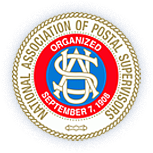Testimony Concerning Five-Day Delivery-06.23.10
Click here to download the PDF version of this document.
Good morning, Chaiman Goldway and members of the Commission.
Thank you for coming to Rapid City to hold this important hearing regarding the
consequences of changing the number of postal delivery days from six to five each
week.
My name is Robert Tolman, and I serve as the South Dakota Legislative
Chair of the National Association of Postal Supervisors, or NAPS.
For the past 20 years, I have served as a postmaster in four different towns
in the Rapid City area. My postal career also includes service as a temporary
supervisor in the Rapid City Post Office for both mail processing tours, the
Computer Forwarding Unit, Window Supervisor, and as an ad-hoc Customer
Service Rep visiting local mailers to help them with their mailing needs.
I appear before you today to express my views as a citizen and as a member
of the National Association of Postal Supervisors. I appear in my own personal
capacity and not as a representative of the United States Postal Service.
In March of 2010, Postmaster General Potter outlined an aggressive plan to
cut costs, increase productivity, and secure legislative and regulatory changes to
maintain a viable postal service. More than 50 solutions were proposed to address
mail volume declines, increases in workforce costs, and changes in consumer
mailing behaviors. One of the most controversial proposals has involved reducing
the frequency of mail delivery from six days a week to five.
I urge the Commission, in rendering its advisory opinion on five-day
delivery, to consider a move to five-day delivery as a last resort in dealing with the
Postal Service’s financial difficulties, not the first option. In recent congressional
testimony, Postmaster General Potter himself acknowledged that five-day delivery
could be avoided were other pressing financial challenges solved. The Postmaster
General confirmed that the return to the Postal Service of the estimated $75 billion
in overpayments for pre-1971-hired Post Office employees would remove the need
for five-day delivery for at least another five years. Knowing that, one wonders
why five-day delivery would be considered and implemented before the pension
overpayment issue has been considered and resolved by Congress.
After all, five-day delivery would have significant ramifications:
• All First-Class street delivery mail sent on Wednesday with a 3-day service
commitment will not make Saturday delivery.
• All mail for 2-day street commitment mail sent on Thursday will be
delayed till Monday, and Friday’s entire overnight street committed
mail will be delayed till Monday.
• All street delivery mail for the entire nation will be affected for those days.
• The same is true for advertising or standard mail but only with different
days of the week in play.
• The plan also calls for any item mailed on Saturday to receive no mail
processing till Monday before moved.
The five-day plan will be experienced and felt directly by the public,
compared to the indirect impact that behind-the-scene cost-saving moves, such
mail processing facility consolidations, generate.
With the five-day plan, I estimate approximately 20-25 percent of all mail
nationwide will be directly affected. The negative outcome of longer delivery
times will be felt immediately, creating public disaffection for mail service. This
will erode the value of mail and, in turn, lead to less use of the postal system. I
believe this is the wrong direction. We need a vibrant, service-oriented
organization that serves our citizens, not one that is retracting service and
removing itself from every-day American life.
In the past few years, consolidations of some mail processing facilities have
been opposed by home-state federal lawmakers because of the adverse impact they
will have upon jobs and postal service at the local level. Five-day delivery will
generate the same outcome on a far more enormous scale.
Most important, the loss of current levels of mail service will be felt by the
entire nation, not just small areas affected by plant consolidations. The loss of
delivery jobs will be nationwide, as opposed to the small loss of locally-impacted
consolidated plant jobs. How many Fortune 500-sized companies would consider
reducing their services with the likely result of opening the door to competitors to
gain market share literally overnight?
Given my twenty years of postal experience, I know of no postal operations
in western South Dakota with fluff and excess employees. The Dakotas District
compliment committee analyzes all vacancies and combines duties before posting
a position. Our employees are expected to reduce any expense wherever possible.
Nationwide last year the Postal Service cut costs by $6 billion dollars.
Customer satisfaction is critical to the success of postal operations, and it
gives me great pride to report, from a 2009 Gallup Research Customer Service
Poll, that the Spearfish, Custer, and Black Hawk Post Offices received the highest
award -- the 5-Star Rating -- for Customer Service. This was no simple
achievement, given what I consider to be a bare minimum operation. Our
employees are still giving their best in these difficult financial times.
In closing, I urge the Commission to continue to carefully study the impact
of the five-day delivery proposal. I do not believe the proposal is consistent with
the Postal Service’s obligation to provide prompt, reliable and efficient postal
services to customers in all areas and all communities across the nation.
Thank you for your public service as members of this important
commission overseeing the Postal Service. All of us in Rapid City are
appreciative of your time and attention to our views. I’ll be available for any
questions you may have.
